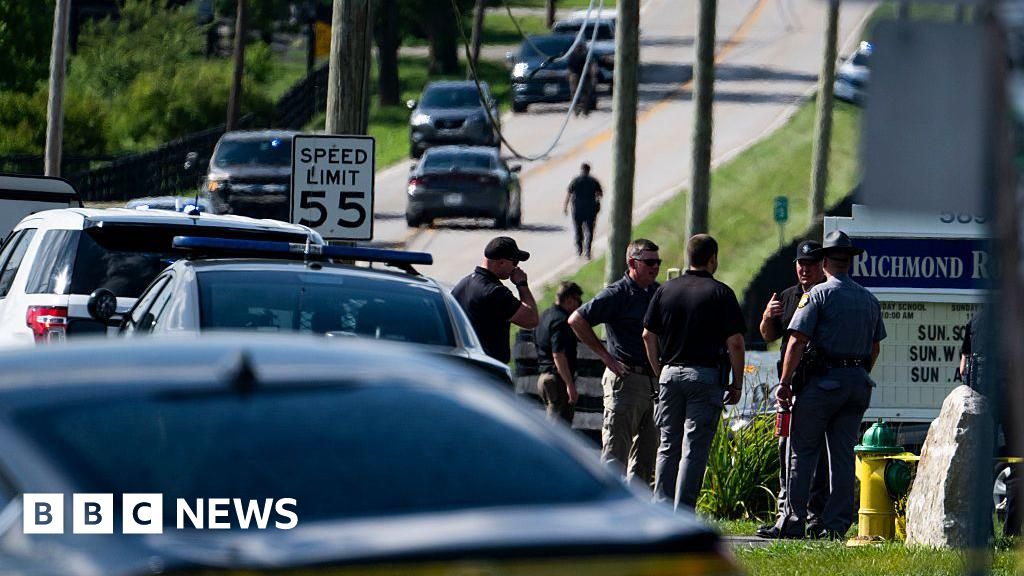Tragic Shooting at Kentucky Church - Importance of Security Measures in Places of Worship

Tragic Shooting at Kentucky Church
In a shocking incident, two women were killed at a church in Kentucky after a gunman opened fire. The suspect, who was later shot dead by the police, is believed to have had a connection to the place of worship. The tragic event has left the community in a state of shock and mourning.
The Connection to the Place of Worship
While the details of the gunman's relationship to the church are still unknown, it is a reminder of the importance of security measures in places of worship. Unfortunately, religious institutions have become targets for violence in recent years, making it crucial for them to have proper safety protocols in place.
The Impact on the Community
The shooting has not only affected the victims and their families, but also the entire community. This tragic event serves as a reminder of the need for stricter gun control laws and the importance of addressing
About the Organizations Mentioned
Kentucky Church
Kentucky Church as a specific organization does not appear to be a singular entity but rather refers to a range of Christian organizations and fellowships operating within Kentucky, each with distinct missions, histories, and structures. Among these, notable organizations include the Cooperative Baptist Fellowship of Kentucky (CBF Kentucky), the Kentucky Council of Churches, the Kentucky Mountain Holiness Association, and the Kentucky Baptist Convention. The **Cooperative Baptist Fellowship of Kentucky (CBF Kentucky)** is a non-profit Christian organization focused on missions and ministry. Founded on April 19, 1991, at St. Matthew's Baptist Church, it serves as a fellowship of churches and individuals guided by a Coordinating Council comprising clergy and laity across Kentucky. CBF Kentucky emphasizes collaborative ministry with work groups dedicated to administration, ministries, and missions, both local and international, reflecting its commitment to orderly and effective service inspired by biblical principles[1]. The **Kentucky Council of Churches** promotes Christian unity and collective witness for justice, peace, and compassion across diverse denominations in Kentucky. It functions as an ecumenical community fostering relationships and accountability among churches that profess Jesus Christ. The Council seeks to increase the visibility and impact of its ministries through partnership and shared life among its members, emphasizing unity that respects diversity under spiritual guidance[2][6]. The **Kentucky Mountain Holiness Association (KMHA)** is a Wesleyan-Holiness aligned Christian denomination founded in 1925 by Lela G. McConnell. It operates schools, a Bible college, radio stations, and a district of churches in eastern Kentucky. KMHA stresses sanctification and holiness in its doctrine and has grown steadily, maintaining a network of about 15 member churches, many of which identify as non-denominational[3]. The **Kentucky Baptist Convention** is a large cooperative body of approximately 2,400 autonomous Baptist churches with roughly 700,000 members. Established in 1837, it is one of the oldest state Baptist conventions an
Police
The police are a foundational organization in modern society, tasked with maintaining public order, enforcing laws, and safeguarding citizens’ lives and property. Historically, policing evolved from informal community watch systems to formalized, state-run institutions, with the first modern police force established in London in 1829 by Sir Robert Peel. This model inspired police organizations worldwide, emphasizing professionalism, accountability, and public service. Police organizations are typically structured hierarchically, with specialized units for patrol, investigation, traffic, and intelligence. They operate through a combination of territorial divisions—such as districts and beats—and functional units like bureaus and sections, ensuring efficient coverage and response. The core functions include crime prevention, law enforcement, emergency response, and community engagement. In recent years, technological advancements have transformed policing, with digital databases, surveillance systems, and data analytics enhancing operational efficiency and crime detection. Key achievements of police organizations include the reduction of crime rates in many regions, the development of community policing strategies, and the successful management of large-scale public events and emergencies. However, challenges such as maintaining public trust, addressing misconduct, and adapting to new forms of crime (like cybercrime) remain significant. Today, police forces globally are increasingly focused on transparency, accountability, and the integration of technology. Initiatives like body-worn cameras, real-time crime centers, and community outreach programs reflect a shift toward more responsive and citizen-centric policing. Notable aspects include the role of police in internal security, counter-terrorism, and protecting critical infrastructure. For business and technology audiences, the police represent a dynamic sector where innovation meets public service, offering insights into organizational management, data-driven decision-making, and the balance between security and civil liberties.















